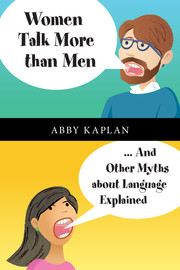1 - Introduction
Published online by Cambridge University Press: 05 April 2016
Summary
In February of 2013, The Journal of Neuroscience published an article under the title ‘Foxp2 mediates sex differences in ultrasonic vocalization by rat pups and directs order of maternal retrieval’. Stories about the paper quickly made the rounds in the popular media, with eye-catching headlines:
● ‘Sorry to interrupt, dear, but women really do talk more than men (13,000 words a day more to be precise)’ (MacRae 2013)
● ‘Chatty Cathy, listen up: New study reveals why women talk more than men’ (Kim 2013)
● ‘Brain protein may explain why girls talk more than boys’ (Castillo 2013)
Reports like these managed to make The Huffington Post look tame by comparison (‘Biological evidence may support idea that women talk more than men, study says’). One frequent reaction was that the study was a waste of money: everybody knows women talk more than men; why do we need a scientific experiment to prove it?
Given publicity like this, many readers would be surprised to learn that the study did no such thing. In fact, the authors didn't examine living humans at all; they compared male and female baby mice (‘pups’), with the following results:
● Male pups made more vocalizations than females when separated from their mothers.
● Male pups had higher levels of the FOXP2 protein than females in some regions of their brains.
● Inhibiting the FOXP2 gene in the pups’ brains eliminated the sex difference: males vocalized less, and females vocalized more.
● In a sample of brain tissue from 10 young human children, the girls had somewhat higher levels of the FOXP2 protein than the boys.
It's a long way from here to ‘Science proves why women talk more than men’, but the reasoning seems to be something like this: FOXP2 causes male rats to talk a lot → FOXP2 does the same thing in all humans → FOXP2 causes female humans to talk a lot. Obviously, this line of reasoning (which the authors didn't endorse in their paper) assumes that women do talk more than men – but the ‘13,000 words’ mentioned in news reports have nothing to do with this study; the number is a zombie statistic, often repeated despite the fact that there is no evidence whatsoever to back it up.
- Type
- Chapter
- Information
- Women Talk More Than Men... And Other Myths about Language Explained, pp. 1 - 6Publisher: Cambridge University PressPrint publication year: 2016



